There will be seven villages at the open day: putting grazing management into practice; sustainable milk production systems; healthy cow-high quality milk; next generation breeding and reproduction; people farming smarter; dairy farm infrastructure; and keeping you and your family safe on the farm.
The village format allows dairy farmers to choose areas that they feel are most important to them, and will allow one-to-one contact with Teagasc researchers and advisers.
Demonstrations on grazing management, reseeding, slurry application methods, nitrogen fertiliser type, farm infrastructure, dairy beef, high-EBI genetics, and health and safety will take place throughout the day.
There will be workshops on non-chlorine protocols for cleaning milking equipment, selective dry cow therapy, pathways into dairy farming and labour management. A number of national experts have accepted invitations to participate in the workshops.
Putting grazing management
into practice
The grassland village will take you through grassland management from establishing your swards, choosing the best grass varieties to suit your system to managing and utilising that grass, as well as producing high-quality silage.
Hear the latest research on spring and autumn grazing management for high stocking rate systems.
Researchers Brian McCarthy and Deirdre Hennessy will be available to discuss the white clover research programme. Find out what white clover can do in grazing systems in terms of herbage production, milk production, nitrogen use efficiency and economic returns. There will be a reseeding demonstration on best practices in relation to weed control organised by Deirdre Hennessy.

Predicting grass growth for the PastureBase tent at the Moorepark 2019 open day. \ Donal O'Leary
Micheal O’Leary will be available to demonstrate how to best use PastureBase Ireland. You will be able to see for yourself how using PastureBase Ireland can help you to maximise the management and utilisation of the grass on your farm. You can sign up to PastureBase Ireland and start using it straight away, or if you need help with PastureBase Ireland, talk to the support team on the day.
Elodie Ruelle will demonstrate the MoSt grass growth model which is being used to predict grass growth on farms across the country.
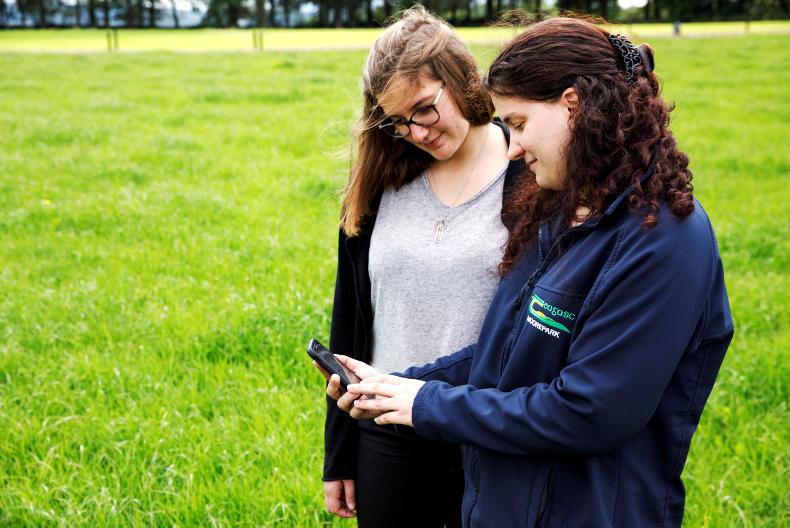
Marie Desmaison and Elodie Ruelle predicting grass growth for the PastureBase tent at the Moorepark 19 open day. \ Donal O'Leary
Pasture profit index and Teagasc grass and clover breeding programme will be outlined by Pat Conaghan, Tomas Tubritt and David Cummins from DAFM. Predictions for the coming week will be available on the day.

Tomas Tubritt measuring the post-grazing height of different varieties as a measure of cow preference for the grassland village at the Moorepark 2019 open day. \ Donal O' Leary
Michael Dineen will discuss the feeding value of grazed grass and how the chemical composition can affect dairy cow performance.
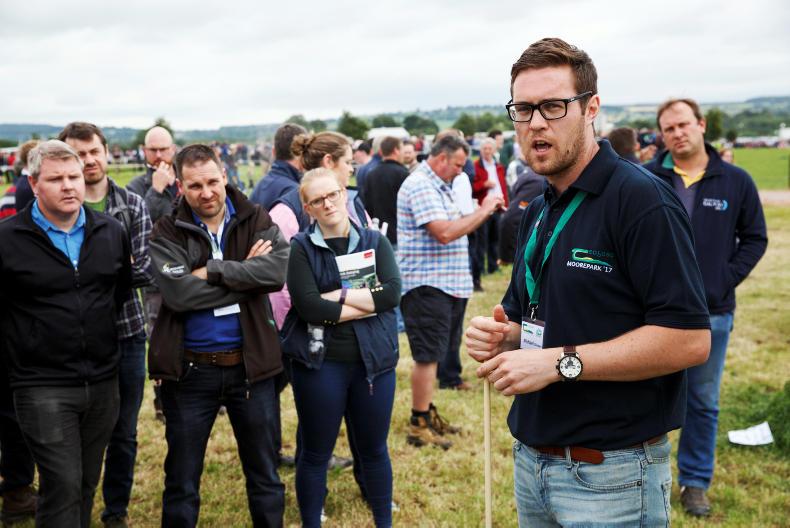
Michael Dineen talks about feeding cows at pasture at the Grass10 village during the Teagasc Moorepark open day in 2017. \ Donal O'Leary
New precision technology research allowing estimation of herbage yield and quality will be presented. Having adequate supplies of high-quality silage is hugely important for all farms. Joe Patton and Brian Garry will provide advice on making high-quality silage.

Mike Egan doing pre-grazing yields for the grazing demo at the Moorepark 2019 open day. \ Donal O'Leary
Find out how to calculate how much silage you need, and develop a plan to ensure an adequate reserve.
Sustainable milk production systems
The sustainable milk production systems village will focus on the key practices and technologies that can be adopted on-farm to produce milk in an economic, environmental and socially sustainable manner.
Brian McCarthy and Daire O’Huallachain have prepared demonstrations in relation to the use of protected urea fertilisers and low-emission slurry application methods, which can enhance the sustainability of dairy systems.

Áine Murray compares the difference in growth between protected urea, CAN and urea for the sustainable milk production systems village at Moorepark 2019 open day. \ Donal O'Leary
Patrick Forrestal will provide an update on the research coming from Johnstown Castle on the use of new fertilisers to reduce greenhouse gas and ammonia emissions. Jack Nolan from DAFM will be available to discuss the importance of increasing nutrient use efficiency on dairy farms.
Finances
George Ramsbottom, Teagasc, will review the main factors influencing the financial profitability of Irish dairy systems. Kevin MacDonald and Brian McCarthy will discuss the importance of calving date and stocking rate, plus grazing platform stocking rate compared with whole farm stocking rate.
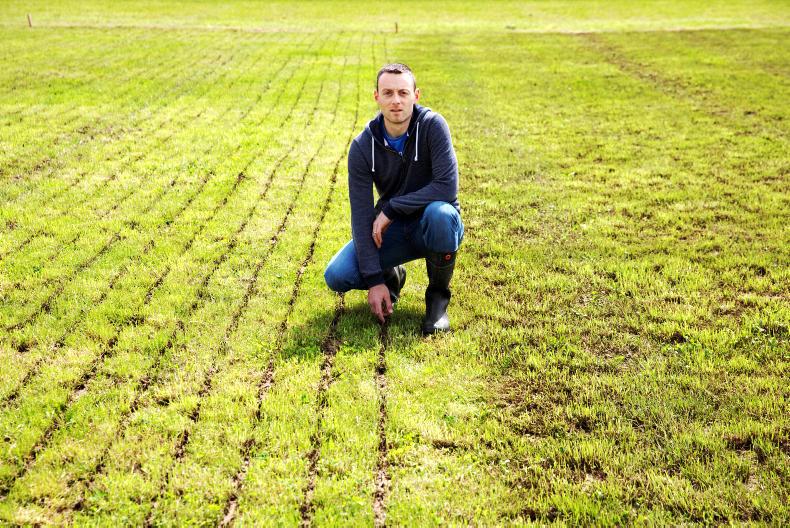
Brian McCarthy checks on the low-emission slurry spreading plots where the splash plate will be compared to the trialling shoe. \Donal O'Leary
Emer Kennedy will update results from the current OAD milking research. There will be updates on all Teagasc research and demonstration dairy farms, including the Greenfield Farm from David Fogarty and Abigail Ryan, Shinagh Dairy Farms from John McNamara and Kevin Ahern, Ballyhaise Agricultural Collage from Donal Patton and Barry Reilly, Solohead from James Humphreys and the Johnstown winter milk herd from Joe Patton and Aidan Lawless.
The Agricultural Catchments Programme and the Agricultural Sustainability Support and Advisory Programme will offer advice on how to improve water quality on dairy farms. Donal O’Brien will outline strategies to reduce the carbon footprint of milk production systems.
Daire O’Huallachain and Donal Sheehan will update on the BRIDE biodiversity project.
Healthy cow, high-quality milk
This village will highlight the importance of producing milk of high quality from animals with excellent health status. There will be a number of stands in this village, with experts from Teagasc and Animal Health Ireland (AHI). The big challenges facing the Irish dairy industry include replacing chlorine-based detergents with alternative detergents for cleaning milking equipment, reducing the level of antibiotics used in an effort to reduce antibiotic resistance and implementing high animal welfare standards on dairy farms. Researchers David Gleeson and Bernie O’Brien will outline how dairy farmers can reduce the levels of Tri Chloro Methane (TCM) and chlorate residues in milk.

Grass variety trials in preparation for the Moorepark 2019 open day. \ Donal O'Leary
The latest research on the efficacy of selective dry cow therapy will be presented by Pablo Silva Bolona and Clare Clabby. John Mee and Marie-Claire McCarthy will discuss animal health implications associated with contract rearing. John Barry and Hazel Costigan will present the latest research in relation to calf health and nutrition. Muireann Conneely and Katie Sugrue will discuss cow welfare and how we can measure it. Don Crowley and Stuart Childs will talk about the importance of milk recording. Niamh Field will discuss managing the health of the cow in early lactation and vaccination protocols.
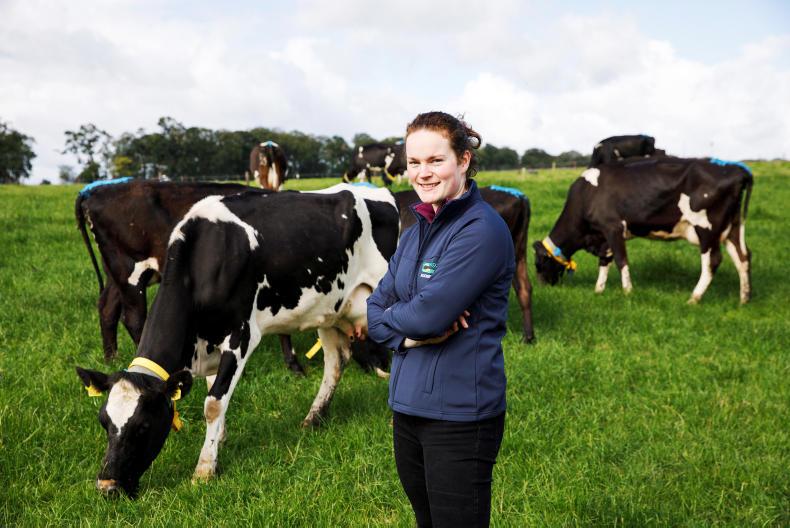
Niamh Field is part of the healthy cow-high quality milk village discussing preventative herd health monitoring. \ Donal O'Leary
The importance of biosecurity will be discussed, especially in relation to Johne’s disease control programmes and breaking the cycle of transmission to susceptible calves.
There will be two workshops chaired by Jack Kennedy and Aidan Brennan (Irish Farmers Journal) on replacing chlorine-based detergents with chlorine-free detergents for cleaning milking equipment and the application of selective dry cow therapy at farm level.
Each panel will include milk quality experts from Teagasc and AHI, representatives from our major dairy processors and dairy farmers. Lorna Citer from AHI will be available to sign up dairy farmers to phase two of the Irish Johne’s control programme.
Next generation breeding and reproduction
The next generation breeding and reproduction village will highlight recent developments in genomic and reproductive technologies to improve farm productivity and profitability.
Recent advancements in genomic evaluations and the value of genotyping dairy heifers will be highlighted. Following the introduction of breeding values for resistance to TB and liver fluke, genetic selection for animal health will be discussed by Alan Twomey.
Developments in sire advice and cow’s own worth decision support tools will be presented, along with novel research on improving milk and meat quality. Shauna Holden and Evelyn Drake will present the results of the recent sexed semen study. Research updates will also be provided on improving uterine health and oestrous expression in dairy cows by Stephen Moore, Richard O’Brien and Kevin Stagg. Sinead McParland will talk about efficiency metrics for a growing herd. Deirdre Purfield will discuss recent advancements in genomic evaluations.
Farmers will also get an update on the performance on the Teagasc Next Generation Holstein Friesian and Jersey herds by Frank Buckley and Orlaith Quigley.
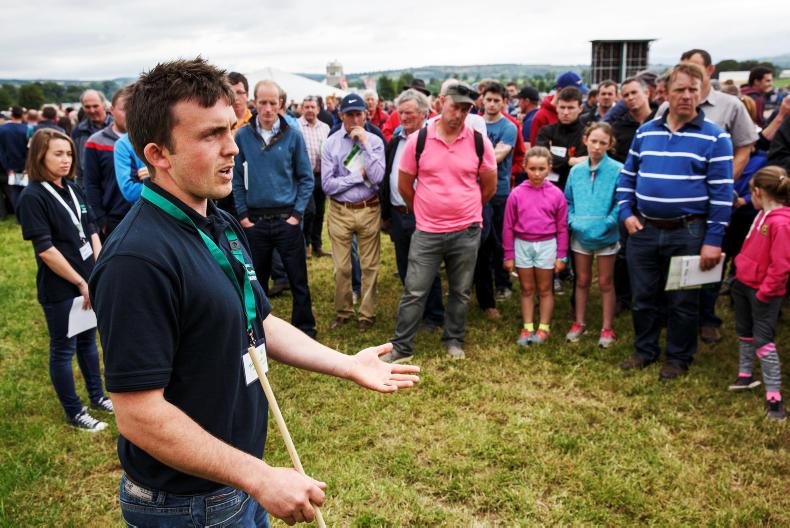
Fergal Coughlan talks about the clover research in Clonakilty at the Grass10 village during the Teagasc Moorepark open day in 2017. \ Donal O'Leary
Kevin Downing from Irish Cattle Breeding Federation will be available to help visitors on recording breeding data and running fertility reports.
The Teagasc dairy-beef research program will feature strongly. Noirin McHugh will outline the key traits that make up the new dairy beef index (DBI), and results to date from ongoing studies evaluating the effect of genetics and stocking rate on the profitability of dairy-beef systems will be presented.
Grange researchers Nicky Byrne and Donall Fahy will present up-to-date performance results from a trial being carried out in Grange comparing Holstein Friesian and Angus progeny that are divergent in breeding values for carcase weight and conformation.
This village is focused on people farming smarter, saving time, being successful and highly profitable. Teagasc education personnel will be there to answer any questions on education and training needs, as will both UCD and UCC to discuss their agricultural science degrees.
Collaborative farming options will be discussed including farm partnerships, share farming and leasing.

Noel Nugent, Teagasc, Kildalton, demonstrating how to make a reef knot at the infrastructure village during the Teagasc Moorepark open day in 2017. \ Donal O'Leary
Finally, Teagasc personnel will also be available on the day to answer any questions on succession and inheritance.
There will two panel discussions and demos:
Becoming an employer of choice; andDo you want to be a dairy farmer?The PICK model demo comes from the discipline of lean management, and can be used to categorise potential projects for their investment potential.
Employer
The demo will also unveil the newly designed “Snakes and Ladder” board to explain what it takes to become the employer of choice.
Nollaig Heffernan, Abigail Ryan and Marion Beecher are leading this demo.
These demos will take place at 1.30pm, 2.45pm and 3.30pm.
Paidi Kelly will hold interactive panel discussions with a number of farmers who have recently converted to dairying: a revisit to a five-year-old conversion; a farmer who became a dairy farmer by way of leasing/partnership (no owned land); and a farmer who is operating a second dairy unit. The focus will be on the individual farmers, with James Moyles, Kay O’Connell and Anne-Marie Butler from Ulster Bank also on the panel. These panel discussions will take place at 1pm, 1.30pm and 3.30pm.
Sustainable workload
Teagasc adviser Patrick Gowing will outline the four mistakes that are most frequently made in farm development and business planning.
Marion Beecher, Abigail Ryan and Martina Gormley will discuss achieving a sustainable workload for everyone working on the farm. This includes identification of options to save time on the farm, from changing work practices to strategic use of contractors and contract rearing. If you are farming anything from 30 to a few hundred cows, there will be plenty of ideas for you on how you can reduce your workload.
The cost-benefit of using contractors will be discussed and why contract-rearing should be seriously considered by many dairy farmers.
Brief panel discussion: promotion of career opportunities in dairying and announcement of photo competition winner at 4pm.Dairy farm
infrastructure
Good grazing infrastructure and an efficient milking system are a requirement on all dairy farms.
Having good farm road ways, adequate water supply, suitably sized and shaped paddocks with multiple access points (plus a drainage system where necessary) are essential to maximise grass utilisation, cow performance, cow health and labour efficiency.
Additionally, milking efficiency can be increased by matching the number of milking units to herd size and improve cow flow through the parlour. Advice on farm roadway design and construction will be available and sample roadway designs showcased.
Well-planned and constructed roadways offer increased accessibility for both livestock and machinery and reduce incidence of lameness.
Pat Tuohy and Denis Brassil will discuss the planning and layout of farms in terms of paddock sizing, accessibility and fencing.
John Upton and Francis Quigley will outline the infrastructure required for efficient milking, drafting and handling operations, as well as strategies to reduce energy consumption and costs in relation to milk cooling and water heating.
The management of automated milking systems will also be discussed. Pat Tuohy will discuss the design and implementation of land drainage systems with options presented for differing soil types and conditions.
Optimised drainage design presents an opportunity to maximise the availability of grazing land and increase production levels. Key elements of the village will be addressed in a dairy farm infrastructure workbook being launched at the open day in association with Ulster Bank, which aims to encourage visitors to review their own infrastructure and plan improvements.
Keeping you and your family safe on farm
Farming is one of the most dangerous work sectors in Ireland. In a typical year, agriculture accounts for about 40% of all workplace deaths, with an average of 20 people dying in farm accidents annually. This is 20 people too many, says Ciaran Roche of FBD.
Training is key and getting that safety message across to farmers and their families is vital. This year in the farm safety village, Teagasc is partnering with FBD to provide a number of practical demonstrations that reflect the major hazards experienced on farms. These include slurry, animal handling, quads, machinery and vehicles, road safety and working at heights.
A farm is a great place to grow up, but unfortunately there are too many farm accidents involving children.
Supervision is central to keeping children safe but education is also crucial if the number of accidents is to be reduced.
Encouraging children to identify farm dangers for themselves will hopefully make them more safety conscious in the future.
Agri Kids will be on site, with interactive discussions and games aimed at educating children in a positive way.
There will be a marquee dedicated to farmer health and wellbeing, with both physical and mental health considered.
Agencies such as the Irish Heart Foundation and the HSE will be present, giving useful advice and highlighting the services available.
There will also be a first aid demonstration where people can learn about CPR and the signs to look out for when dealing with stroke or heart attack.
Read more
Main stands at Moorepark 2019
Further attractions at Moorepark 2019
All eyes on Ornua boss at Moorepark
There will be seven villages at the open day: putting grazing management into practice; sustainable milk production systems; healthy cow-high quality milk; next generation breeding and reproduction; people farming smarter; dairy farm infrastructure; and keeping you and your family safe on the farm.
The village format allows dairy farmers to choose areas that they feel are most important to them, and will allow one-to-one contact with Teagasc researchers and advisers.
Demonstrations on grazing management, reseeding, slurry application methods, nitrogen fertiliser type, farm infrastructure, dairy beef, high-EBI genetics, and health and safety will take place throughout the day.
There will be workshops on non-chlorine protocols for cleaning milking equipment, selective dry cow therapy, pathways into dairy farming and labour management. A number of national experts have accepted invitations to participate in the workshops.
Putting grazing management
into practice
The grassland village will take you through grassland management from establishing your swards, choosing the best grass varieties to suit your system to managing and utilising that grass, as well as producing high-quality silage.
Hear the latest research on spring and autumn grazing management for high stocking rate systems.
Researchers Brian McCarthy and Deirdre Hennessy will be available to discuss the white clover research programme. Find out what white clover can do in grazing systems in terms of herbage production, milk production, nitrogen use efficiency and economic returns. There will be a reseeding demonstration on best practices in relation to weed control organised by Deirdre Hennessy.

Predicting grass growth for the PastureBase tent at the Moorepark 2019 open day. \ Donal O'Leary
Micheal O’Leary will be available to demonstrate how to best use PastureBase Ireland. You will be able to see for yourself how using PastureBase Ireland can help you to maximise the management and utilisation of the grass on your farm. You can sign up to PastureBase Ireland and start using it straight away, or if you need help with PastureBase Ireland, talk to the support team on the day.
Elodie Ruelle will demonstrate the MoSt grass growth model which is being used to predict grass growth on farms across the country.

Marie Desmaison and Elodie Ruelle predicting grass growth for the PastureBase tent at the Moorepark 19 open day. \ Donal O'Leary
Pasture profit index and Teagasc grass and clover breeding programme will be outlined by Pat Conaghan, Tomas Tubritt and David Cummins from DAFM. Predictions for the coming week will be available on the day.

Tomas Tubritt measuring the post-grazing height of different varieties as a measure of cow preference for the grassland village at the Moorepark 2019 open day. \ Donal O' Leary
Michael Dineen will discuss the feeding value of grazed grass and how the chemical composition can affect dairy cow performance.

Michael Dineen talks about feeding cows at pasture at the Grass10 village during the Teagasc Moorepark open day in 2017. \ Donal O'Leary
New precision technology research allowing estimation of herbage yield and quality will be presented. Having adequate supplies of high-quality silage is hugely important for all farms. Joe Patton and Brian Garry will provide advice on making high-quality silage.

Mike Egan doing pre-grazing yields for the grazing demo at the Moorepark 2019 open day. \ Donal O'Leary
Find out how to calculate how much silage you need, and develop a plan to ensure an adequate reserve.
Sustainable milk production systems
The sustainable milk production systems village will focus on the key practices and technologies that can be adopted on-farm to produce milk in an economic, environmental and socially sustainable manner.
Brian McCarthy and Daire O’Huallachain have prepared demonstrations in relation to the use of protected urea fertilisers and low-emission slurry application methods, which can enhance the sustainability of dairy systems.

Áine Murray compares the difference in growth between protected urea, CAN and urea for the sustainable milk production systems village at Moorepark 2019 open day. \ Donal O'Leary
Patrick Forrestal will provide an update on the research coming from Johnstown Castle on the use of new fertilisers to reduce greenhouse gas and ammonia emissions. Jack Nolan from DAFM will be available to discuss the importance of increasing nutrient use efficiency on dairy farms.
Finances
George Ramsbottom, Teagasc, will review the main factors influencing the financial profitability of Irish dairy systems. Kevin MacDonald and Brian McCarthy will discuss the importance of calving date and stocking rate, plus grazing platform stocking rate compared with whole farm stocking rate.

Brian McCarthy checks on the low-emission slurry spreading plots where the splash plate will be compared to the trialling shoe. \Donal O'Leary
Emer Kennedy will update results from the current OAD milking research. There will be updates on all Teagasc research and demonstration dairy farms, including the Greenfield Farm from David Fogarty and Abigail Ryan, Shinagh Dairy Farms from John McNamara and Kevin Ahern, Ballyhaise Agricultural Collage from Donal Patton and Barry Reilly, Solohead from James Humphreys and the Johnstown winter milk herd from Joe Patton and Aidan Lawless.
The Agricultural Catchments Programme and the Agricultural Sustainability Support and Advisory Programme will offer advice on how to improve water quality on dairy farms. Donal O’Brien will outline strategies to reduce the carbon footprint of milk production systems.
Daire O’Huallachain and Donal Sheehan will update on the BRIDE biodiversity project.
Healthy cow, high-quality milk
This village will highlight the importance of producing milk of high quality from animals with excellent health status. There will be a number of stands in this village, with experts from Teagasc and Animal Health Ireland (AHI). The big challenges facing the Irish dairy industry include replacing chlorine-based detergents with alternative detergents for cleaning milking equipment, reducing the level of antibiotics used in an effort to reduce antibiotic resistance and implementing high animal welfare standards on dairy farms. Researchers David Gleeson and Bernie O’Brien will outline how dairy farmers can reduce the levels of Tri Chloro Methane (TCM) and chlorate residues in milk.

Grass variety trials in preparation for the Moorepark 2019 open day. \ Donal O'Leary
The latest research on the efficacy of selective dry cow therapy will be presented by Pablo Silva Bolona and Clare Clabby. John Mee and Marie-Claire McCarthy will discuss animal health implications associated with contract rearing. John Barry and Hazel Costigan will present the latest research in relation to calf health and nutrition. Muireann Conneely and Katie Sugrue will discuss cow welfare and how we can measure it. Don Crowley and Stuart Childs will talk about the importance of milk recording. Niamh Field will discuss managing the health of the cow in early lactation and vaccination protocols.

Niamh Field is part of the healthy cow-high quality milk village discussing preventative herd health monitoring. \ Donal O'Leary
The importance of biosecurity will be discussed, especially in relation to Johne’s disease control programmes and breaking the cycle of transmission to susceptible calves.
There will be two workshops chaired by Jack Kennedy and Aidan Brennan (Irish Farmers Journal) on replacing chlorine-based detergents with chlorine-free detergents for cleaning milking equipment and the application of selective dry cow therapy at farm level.
Each panel will include milk quality experts from Teagasc and AHI, representatives from our major dairy processors and dairy farmers. Lorna Citer from AHI will be available to sign up dairy farmers to phase two of the Irish Johne’s control programme.
Next generation breeding and reproduction
The next generation breeding and reproduction village will highlight recent developments in genomic and reproductive technologies to improve farm productivity and profitability.
Recent advancements in genomic evaluations and the value of genotyping dairy heifers will be highlighted. Following the introduction of breeding values for resistance to TB and liver fluke, genetic selection for animal health will be discussed by Alan Twomey.
Developments in sire advice and cow’s own worth decision support tools will be presented, along with novel research on improving milk and meat quality. Shauna Holden and Evelyn Drake will present the results of the recent sexed semen study. Research updates will also be provided on improving uterine health and oestrous expression in dairy cows by Stephen Moore, Richard O’Brien and Kevin Stagg. Sinead McParland will talk about efficiency metrics for a growing herd. Deirdre Purfield will discuss recent advancements in genomic evaluations.
Farmers will also get an update on the performance on the Teagasc Next Generation Holstein Friesian and Jersey herds by Frank Buckley and Orlaith Quigley.

Fergal Coughlan talks about the clover research in Clonakilty at the Grass10 village during the Teagasc Moorepark open day in 2017. \ Donal O'Leary
Kevin Downing from Irish Cattle Breeding Federation will be available to help visitors on recording breeding data and running fertility reports.
The Teagasc dairy-beef research program will feature strongly. Noirin McHugh will outline the key traits that make up the new dairy beef index (DBI), and results to date from ongoing studies evaluating the effect of genetics and stocking rate on the profitability of dairy-beef systems will be presented.
Grange researchers Nicky Byrne and Donall Fahy will present up-to-date performance results from a trial being carried out in Grange comparing Holstein Friesian and Angus progeny that are divergent in breeding values for carcase weight and conformation.
This village is focused on people farming smarter, saving time, being successful and highly profitable. Teagasc education personnel will be there to answer any questions on education and training needs, as will both UCD and UCC to discuss their agricultural science degrees.
Collaborative farming options will be discussed including farm partnerships, share farming and leasing.

Noel Nugent, Teagasc, Kildalton, demonstrating how to make a reef knot at the infrastructure village during the Teagasc Moorepark open day in 2017. \ Donal O'Leary
Finally, Teagasc personnel will also be available on the day to answer any questions on succession and inheritance.
There will two panel discussions and demos:
Becoming an employer of choice; andDo you want to be a dairy farmer?The PICK model demo comes from the discipline of lean management, and can be used to categorise potential projects for their investment potential.
Employer
The demo will also unveil the newly designed “Snakes and Ladder” board to explain what it takes to become the employer of choice.
Nollaig Heffernan, Abigail Ryan and Marion Beecher are leading this demo.
These demos will take place at 1.30pm, 2.45pm and 3.30pm.
Paidi Kelly will hold interactive panel discussions with a number of farmers who have recently converted to dairying: a revisit to a five-year-old conversion; a farmer who became a dairy farmer by way of leasing/partnership (no owned land); and a farmer who is operating a second dairy unit. The focus will be on the individual farmers, with James Moyles, Kay O’Connell and Anne-Marie Butler from Ulster Bank also on the panel. These panel discussions will take place at 1pm, 1.30pm and 3.30pm.
Sustainable workload
Teagasc adviser Patrick Gowing will outline the four mistakes that are most frequently made in farm development and business planning.
Marion Beecher, Abigail Ryan and Martina Gormley will discuss achieving a sustainable workload for everyone working on the farm. This includes identification of options to save time on the farm, from changing work practices to strategic use of contractors and contract rearing. If you are farming anything from 30 to a few hundred cows, there will be plenty of ideas for you on how you can reduce your workload.
The cost-benefit of using contractors will be discussed and why contract-rearing should be seriously considered by many dairy farmers.
Brief panel discussion: promotion of career opportunities in dairying and announcement of photo competition winner at 4pm.Dairy farm
infrastructure
Good grazing infrastructure and an efficient milking system are a requirement on all dairy farms.
Having good farm road ways, adequate water supply, suitably sized and shaped paddocks with multiple access points (plus a drainage system where necessary) are essential to maximise grass utilisation, cow performance, cow health and labour efficiency.
Additionally, milking efficiency can be increased by matching the number of milking units to herd size and improve cow flow through the parlour. Advice on farm roadway design and construction will be available and sample roadway designs showcased.
Well-planned and constructed roadways offer increased accessibility for both livestock and machinery and reduce incidence of lameness.
Pat Tuohy and Denis Brassil will discuss the planning and layout of farms in terms of paddock sizing, accessibility and fencing.
John Upton and Francis Quigley will outline the infrastructure required for efficient milking, drafting and handling operations, as well as strategies to reduce energy consumption and costs in relation to milk cooling and water heating.
The management of automated milking systems will also be discussed. Pat Tuohy will discuss the design and implementation of land drainage systems with options presented for differing soil types and conditions.
Optimised drainage design presents an opportunity to maximise the availability of grazing land and increase production levels. Key elements of the village will be addressed in a dairy farm infrastructure workbook being launched at the open day in association with Ulster Bank, which aims to encourage visitors to review their own infrastructure and plan improvements.
Keeping you and your family safe on farm
Farming is one of the most dangerous work sectors in Ireland. In a typical year, agriculture accounts for about 40% of all workplace deaths, with an average of 20 people dying in farm accidents annually. This is 20 people too many, says Ciaran Roche of FBD.
Training is key and getting that safety message across to farmers and their families is vital. This year in the farm safety village, Teagasc is partnering with FBD to provide a number of practical demonstrations that reflect the major hazards experienced on farms. These include slurry, animal handling, quads, machinery and vehicles, road safety and working at heights.
A farm is a great place to grow up, but unfortunately there are too many farm accidents involving children.
Supervision is central to keeping children safe but education is also crucial if the number of accidents is to be reduced.
Encouraging children to identify farm dangers for themselves will hopefully make them more safety conscious in the future.
Agri Kids will be on site, with interactive discussions and games aimed at educating children in a positive way.
There will be a marquee dedicated to farmer health and wellbeing, with both physical and mental health considered.
Agencies such as the Irish Heart Foundation and the HSE will be present, giving useful advice and highlighting the services available.
There will also be a first aid demonstration where people can learn about CPR and the signs to look out for when dealing with stroke or heart attack.
Read more
Main stands at Moorepark 2019
Further attractions at Moorepark 2019
All eyes on Ornua boss at Moorepark














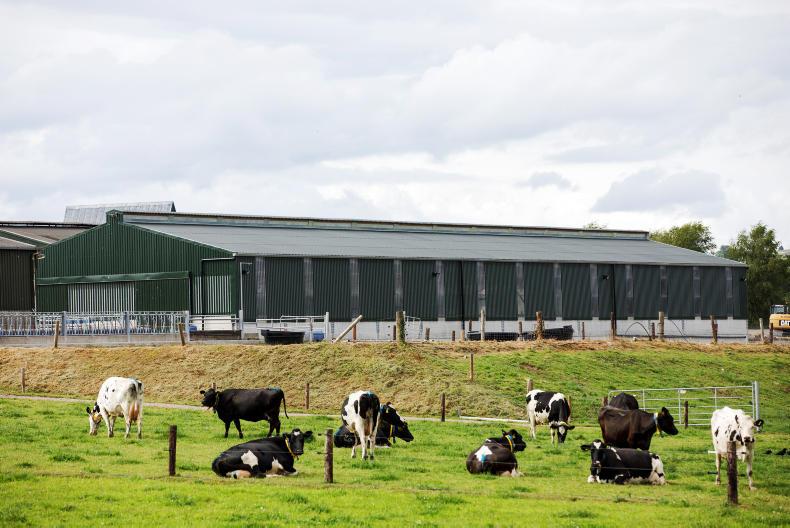
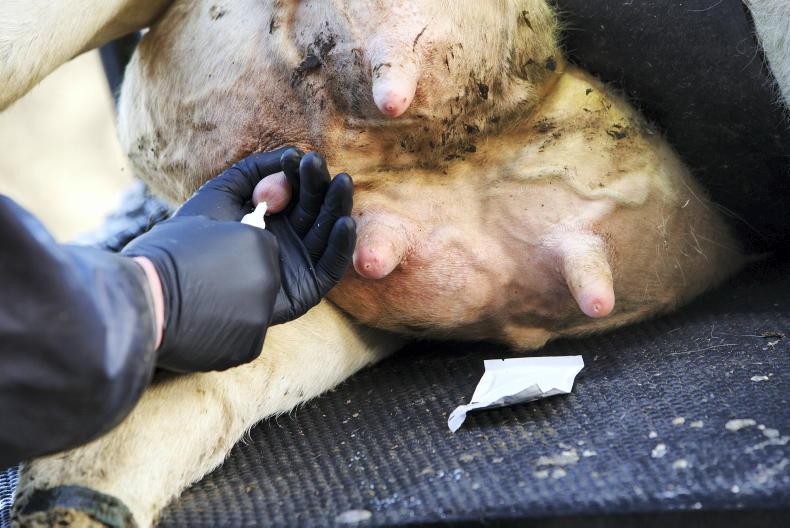

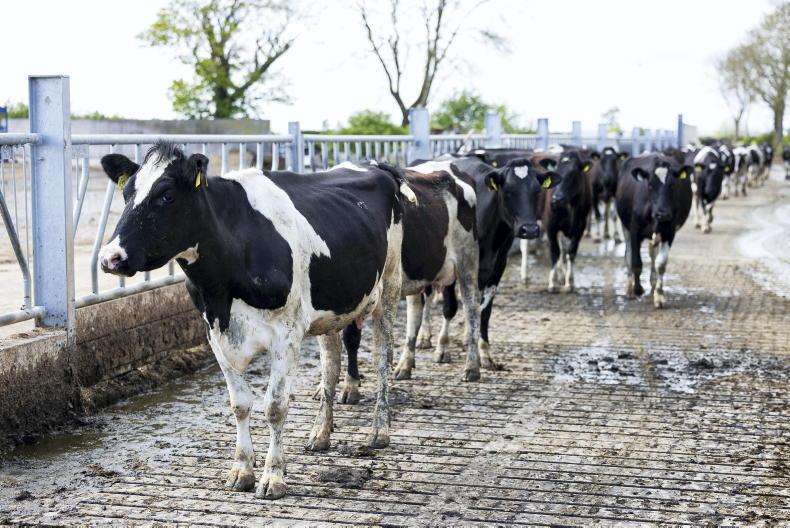
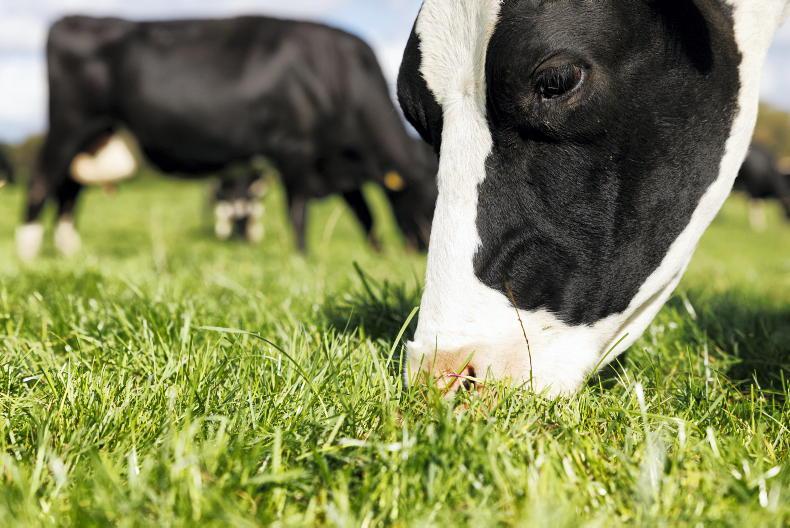
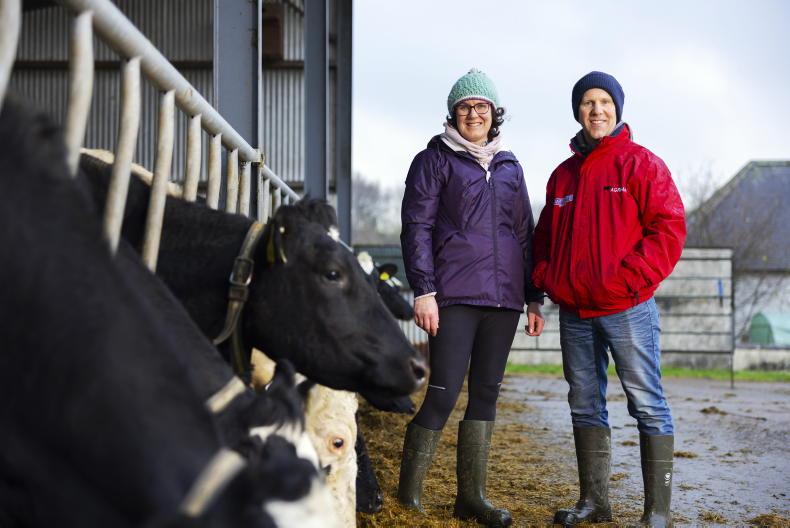
SHARING OPTIONS